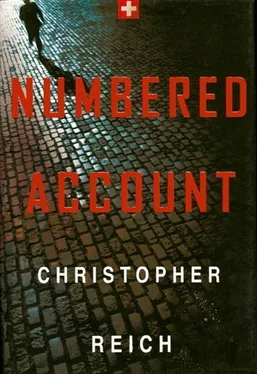Peter Sprecher claimed that prior to implementation of the “draconian” legislation, many of banking’s wiser heads had set aside several thousand numbered accounts to be held in the names of their favored Treuhander, or financial middlemen. These accounts were made available to special clients of the bank interested in keeping their identity a secret—“grandfathered,” as it were. The minimum deposit required to obtain such a numbered account, no meddlesome questions asked, was five million dollars. One had to keep the riffraff out.
“The code word?” Nick repeated.
“Ciragan Palace,” said client 549.617 RR.
Nick smiled to himself. The Ciragan Palace in Istanbul had been home to the latter Turkish viziers in the nineteenth century. Clearly, Marco Cerruti had been pointing a finger at his client’s nationality when christening him the Pasha.
“I confirm, sir, Ciragan Palace,” Nick stated. “My bank reference is NXM, the family name is Neumann.” He spelled it, then asked his client if he had understood. There was an extended silence punctuated only by a rhythmic liquid clicking. Nick brought his chair closer to his desk and leaned over the Pasha’s file, as if physical proximity to his client’s paperwork would hasten the response.
“Loud and clear, Mr. Neumann,” the Pasha said with renewed vigor. “Now may we proceed to business? Please tell me the current balance of my account, 549.617 RR.”
Nick entered the account number into Cerberus, followed by the coded instructions AB30A to request the account’s balance. A microsecond later, the display spit forth the results of his inquiry. His eyes widened. The balance had never been this high. “Your account holds forty-seven million U.S. dollars.”
“Forty-seven million,” the Pasha repeated slowly. If there was any pleasure to be had in finding such an astronomical sum in one’s account, the gruff voice did not betray it. “Mr. Neumann, you have all my transfer instructions, yes? Please look at transfer matrix six.”
Nick withdrew the sheet from the file on his desk. Matrix six detailed specific instructions to transfer a given sum, today the tidy amount of forty-seven million U.S. dollars, to banks in Austria, Germany, Norway, Singapore, Hong Kong, and the Cayman Islands.
“Matrix six involves the transfer of the entire amount to a total of twenty-two banks,” said Nick.
“That is correct, Mr. Neumann,” the Pasha answered. “You sound hesitant. Is there any problem? Would you like to review the banks to whom you must wire these funds?”
“No, sir,” Nick said. “No problem.” His eye caught the corner of the account surveillance list peeking from under the Pasha’s file. He did not consider telling the client about the existence of the list or that his account was on it. The bank’s cooperation with the authorities was voluntary. And confidential. “But I would like to review the names of the correspondent banks. To ensure we are one hundred percent correct.” He began with the first bank on the list. “Deutsche Bank, Frankfurt Head Office.”
“Correct.”
“South West Landesbank, Munich.”
“Correct.”
“Norske Bank, Oslo,” Nick droned, waiting for the impatient grunt that confirmed each name. “Kreditanstalt of Austria, Vienna…” His eyes darted around the office. Peter Sprecher, absent. Marco Cerruti, absent. A quote he’d memorized during an endless Pacific float came to mind. “Isolation is the sole crucible in which man’s character may be forged.” He had forgotten who had written the words, but at this instant, he fully understood their meaning.
“Bank Negara, Hong Kong branch office. Bank Sanwa, Singapore…” Nick continued reading the list of banks while the memory of Sterling Thorne’s short speech made a surprise entrance onto the stage. Elephant hunting, rogue males, game wardens. The words provoked an almost physical revulsion in him. He had met one of Thorne’s kind before. Mr. Jack Keely of the Central Intelligence Agency—like Thorne, an overzealous caretaker of his government’s sacred rules and regulations, eager to co-opt others into his service. Nick had responded to the call of Keely’s bugle. He had stepped forward of his own volition, and he had paid the price for his naive pursuit of glory. Never again, he had sworn when the affair was finally over. Not for Keely. Not for Thorne. Not for anyone.
“I confirm a total of twenty-two institutions,” Nick said, in conclusion.
“Thank you, Mr. Neumann. Be sure these funds are transferred by the end of your business day. I am not tolerant of errors.”
The Pasha rang off.
Nick replaced the receiver in its cradle. He was on his own now, and a stern voice reminded him that was how he liked it. The decision was his. The clock above Sprecher’s desk read 15:06. He moved the transfer of funds form closer, noting the time of the order, then began filling out the necessary details. In the upper left-hand corner, he inscribed the six-digit and two-letter account number. Below it, in a rectangular space requesting the client’s name, he wrote “N.A.,” not available. Under “wire instructions,” he penned “matrix six (per client instructions), see screen CC21B.” And in the box marked “value,” he wrote a forty-seven followed by six zeros. Two boxes remained to be filled in: “validity date”—when the instructions should be executed—and “initials of responsible employee.” He wrote his three-letter employee identification in one box. He left the other box empty.
Nick rolled his chair back from his desk, slid open the top drawer, and laid the transfer of funds form at the far back corner. He had settled on a course of action.
For the next two hours, he busied himself checking and double-checking numbered accounts 220.000 AA through 230.999 ZZ for all bonds due to mature in the next thirty days. At 5:30, he refolded the last of the portfolios and stacked them in the cabinet behind him. He collected the remaining papers on his desk and arranged them in some logical order before placing them in the second drawer. All confidential documents were filed away and locked under key for the night. His desk was spotless. Armin Schweitzer rejoiced in patrolling the offices after hours, scouring the deserted building for stray papers carelessly left unfiled or unprotected. Offending parties were sure to catch hell the next morning.
Just prior to leaving the office, Nick opened his top drawer and withdrew the transfer of funds sheet bearing the Pasha’s account number and wire instructions. He guided his pen to the single box yet to be filled in, that for validity date, and scribbled the next day’s date. His scrawl was unreadable so as to ensure a delay of two to three hours before Pietro in Payments Traffic telephoned for clarification. Given the usual Friday logjam, the transfer would never be made before Monday morning. Satisfied, he walked down the hallway to the department’s mail nook and picked up an intrabank envelope. He addressed it to Zahlungs Verkehr Ausland, International Payments Traffic, then slipped the sheet inside and carefully secured the figure-eight clasp. He took a last look at the envelope, then dropped it into the cotton gunnysack that held the bank’s internal mail.
It was done.
Having willfully disobeyed the clearest instructions of his superiors and defied the orders of a major Western law-enforcement agency to protect a man he had never met and uphold a policy he did not believe in, Nick extinguished the Hothouse’s nagging lights, certain that he had taken his first step toward the dark heart of the bank and the secrets that lay behind his father’s death.
Ali Mevlevi never tired of watching the sun set over the Mediterranean Sea. In summer, he would take his place in one of the rattan chairs set upon the veranda and let his thoughts drift out across the shimmering water as he kept careful watch of the fiery orb’s descent. In winter, on evenings such as this, he had but a few minutes to enjoy the passing of day through dusk and into night. Looking out over the westernmost edge of the Arab Middle East, he followed the sun as it sank deeper into a nest of billowy clouds huddled close to the horizon. A breeze skittered across the terrace and in its wake spread hints of eucalyptus and cedar.
Читать дальше












